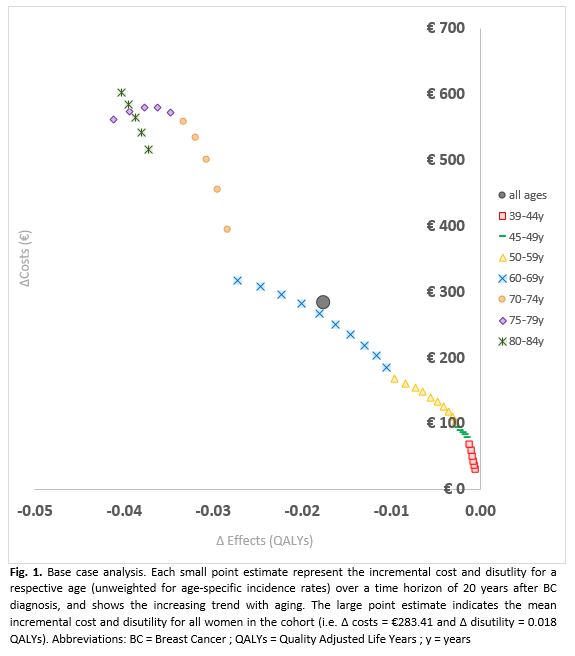Quantifying societal burden of radiation-induced cardiovascular events in breast cancer survivors
PO-1035
Abstract
Quantifying societal burden of radiation-induced cardiovascular events in breast cancer survivors
Authors: Eva Kimpe1, Amber Werbrouck1, Mark De Ridder2, Koen Putman1
1Vrije Universiteit Brussel, Public Health, Brussels, Belgium; 2University Hospital Brussels, Radiotherapy, Brussels, Belgium
Show Affiliations
Hide Affiliations
Purpose or Objective
Radiation-induced
cardiotoxicity is an important health concern for clinicians during the
treatment of breast cancer (BC) patients. Underlying mechanisms are well-documented, whereas little is known about the societal impact of this long-term
effect. This study aimed to quantify the additional burden of radiation-induced
cardiovascular (CV) diseases in BC survivors.
Material and Methods
Conventional
health economic modelling techniques were used to estimate incremental
CV-related costs and disutility -expressed in quality adjusted life years
(QALYs)- in a hypothetical cohort of BC survivors. A situation in which
radiotherapy caused an additional CV risk was compared with a situation in
which this risk was not taken into account. Uncertainty was assessed via
sensitivity analyses.
Results
Radiation-induced
cardiotoxicity evokes a mean expected incremental cost of €283.41 per woman
over a time horizon of 20 years after BC treatment. An mean expected decrement
of 0.018 QALYs (per woman) might be estimated when the radiation-induced
cardiotoxic risk is taken into account in BC survivors. Incremental costs and
disutility increased with index age (see figure 1). A scenario analysis showed that these
results were more profound in women with more advanced staging.

Conclusion
In the past
decades, strong emphasis has been placed on strategies to counteract
radiation-induced cardiotoxic effects in BC patients. To date, there is a
general belief that continuing efforts should be made to lower mean heart
doses. On the contrary, our analyses suggest that with current radiation doses,
minor costs and disutility are to be expected from radiation-induced
cardiotoxicity in BC survivors. With regard to the opportunity costs of further
efforts and investments on counteract radiation-induced cardiotoxic effects,
this new insight should encourage radiation-oncologists to consider other
priorities to tackle long-term comorbidities in cancer survivors.